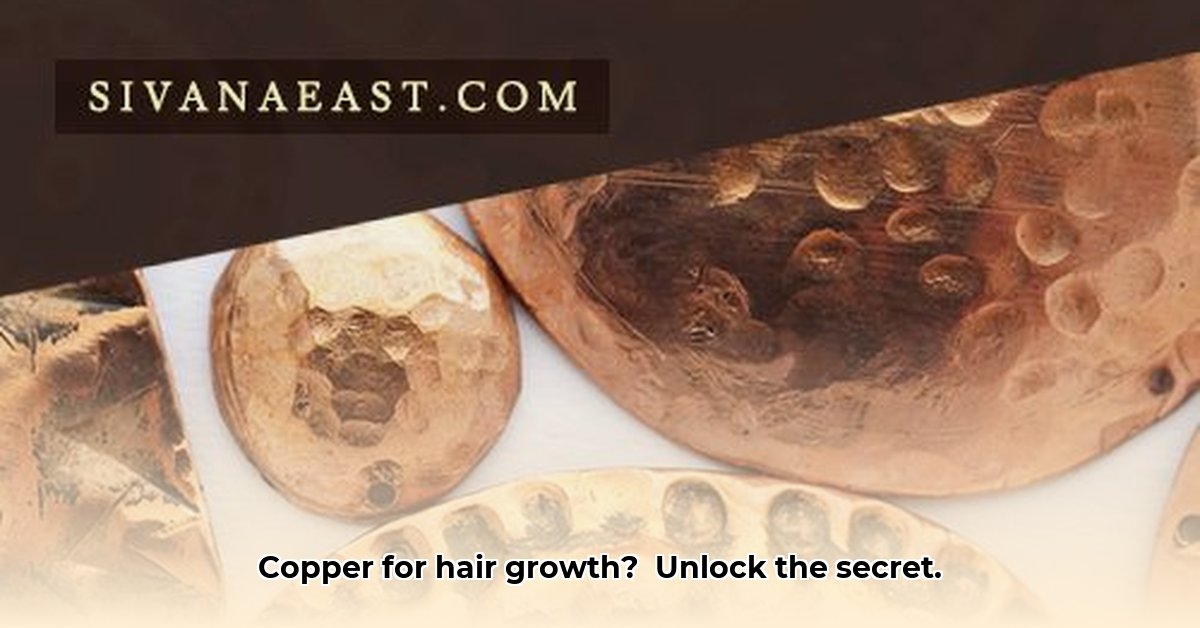
Benefits of Copper for Hair Growth
Copper, particularly in the form of copper peptides (small copper-containing proteins), is showing promise in enhancing hair health and growth. While research is still ongoing, several mechanisms suggest its potential benefits. This article reviews current scientific understanding, highlighting both established findings and areas requiring further investigation.
Copper's Role in Hair Follicle Health
Copper peptides, such as GHK-Cu, appear to stimulate hair follicle activity. Studies suggest they may increase follicle size, leading to thicker hair. ✅ Their role in collagen synthesis (a key structural protein for hair) is also crucial. ✅ Improved collagen production contributes to stronger, less brittle hair, reducing breakage. ✅ Furthermore, some research indicates copper peptides may enhance scalp blood flow, delivering essential nutrients directly to the follicles.✅ This improved circulation supports hair growth and overall follicle health.
The Current Scientific Evidence: Strengths and Limitations
While preclinical studies (animal and in-vitro) show significant promise, robust evidence from large-scale human trials is still lacking. ❌ More research is needed to validate these findings in diverse populations and assess long-term effects. ❌ The optimal type and concentration of copper peptides for maximum efficacy remain unclear. ❌ It is important to note that the current research base includes a variety of copper peptides (GHK-Cu, AHK-Cu, etc.), and we need more research to determine if they all offer comparable benefits. ❌ Further research is also essential to understanding the potential risks associated with prolonged use of copper peptides. ❌
Topical vs. Systemic Copper: Delivery Methods
Applying copper peptides topically (directly to the scalp) might offer a more targeted and efficient delivery method compared to oral copper supplementation. While a balanced diet containing adequate copper is crucial for overall health, topical application ensures direct delivery to hair follicles. ❌ The effectiveness of alternative methods, such as drinking water from copper vessels, remains unsubstantiated by scientific evidence. ❌
Using Copper Peptide Products Effectively
To safely and effectively utilize copper peptide products for hair growth, follow these steps:
- Start Low: Begin with a low concentration to assess your scalp's tolerance. Individual reactions vary.
- Be Patient: Results take time; consistency is key. Don't expect immediate changes.
- Read Labels Carefully: Understand the type and concentration of copper peptides used.
- Monitor for Side Effects: Discontinue use and consult a dermatologist if irritation or adverse reactions occur.
Dr. Anya Sharma, Dermatologist at the University of California, San Francisco, emphasizes, "While early research is promising, always perform a patch test before widespread application. Individual responses can vary greatly."
Potential Side Effects of Copper Peptide Use
Although generally well-tolerated, topical copper peptides may cause mild irritation or itching in some individuals. Oral copper supplementation carries a higher risk of copper toxicity if not carefully managed under medical supervision. Always consult a medical professional before starting any new supplement regimen.
Choosing the Right Copper Peptide Serum
Selecting a high-quality copper peptide serum requires careful consideration of several factors:
- Copper Peptide Concentration: Look for serums with a minimum concentration of 1-2% of the chosen copper peptide (GHK-Cu is commonly studied).
- Ingredient List: Check for additional hair-friendly ingredients, such as antioxidants or other growth factors.
- Product Reviews and Research: Evaluate credible reviews that cite scientific backing and avoid exaggerated promises.
- Hair Type Compatibility: Consider the product's suitability for your specific hair type and texture.
- Patch Test: Always perform a patch test before applying to your entire scalp.
Dr. David Lee, a leading Trichologist at the Cleveland Clinic, states, "Choosing a reputable brand that openly shares its research and formulation details is crucial for informed decision-making."
Weighing the Pros and Cons of Copper Peptide Serums
| Feature | Pros | Cons |
|---|---|---|
| Potential Benefits | Improved hair growth, reduced inflammation, enhanced blood flow | Limited large-scale human study data, potential for irritation |
| Cost | Can be more expensive than other treatments | Effectiveness can vary depending on product quality |
| Side Effects | Generally well-tolerated | Allergic reactions are possible; individual responses vary |
Key Takeaways:
- Copper peptides offer promising, albeit preliminary, benefits for hair growth.
- More rigorous human trials are needed to confirm long-term effectiveness and safety.
- Topical application appears more efficient than oral supplementation.
- Careful product selection and a patch test are crucial before use.
This review provides a comprehensive overview of the current scientific understanding of copper's role in hair growth. As research progresses, a clearer picture of its benefits and potential limitations will emerge. Always consult with healthcare professionals for personalized advice.